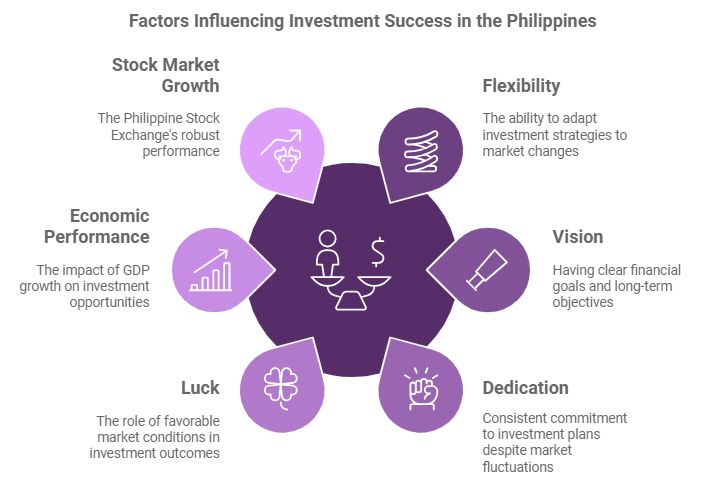Venturing into the world of managed funds and investments can be both exciting and daunting for many in the Philippines because this journey often starts with understanding the basics of financial planning and navigating through countless options.
The demand for a strategic approach, combined with the nuances of the Philippine market, makes it essential to be well-informed. That is why, in this article, we will explore how managed funds work in the unique investment landscape in the Philippines and highlight some of the country's top-performing investments.
Moreover, this detailed article will help you discover the critical strategies for flexibility, dedication, and setting clear financial goals while navigating through the immensely unpredictable elements of luck that come with investing. So, without further ado, let us get down to it.

Managed Funds and Investments in the Philippines - A Detailed Overview
Having a plan is critical to securing your financial future, and managing funds and investments in the Philippines offers an effective way to grow your wealth. However, to make the most of these opportunities, you need a mix of flexibility, vision, dedication, and a bit of luck.
Professional managers in the Philippines manage and diversify investors' money into stocks, bonds, and other securities while also handling mutual funds to provide expert oversight to maximize returns. A well-managed, diversified portfolio can often handle market fluctuations better than individual investors might on their own.
Here, take a look at the crucial factors that determine the effective management of funds and investments in the Philippines -

1. Flexibility in Investing
Markets are unpredictable. A rigid approach can limit your ability to adapt to changes. A flexible investment strategy allows you to pivot when necessary, seizing new opportunities.
2. Vision and Financial Goals
Having a clear picture of your financial goals is crucial. Are you aiming for short-term gains, or are you in it for the long run? Understanding your objectives helps in tailoring your investment strategy.
3. Dedication to Your Plan
Consistency and commitment are essential. The market will have its ups and downs, and sticking to a long-term strategy during turbulent times is critical. Hasty decisions often lead to regrettable losses. Hence, balancing flexibility with commitment can help manage investment volatility.
4. The Role of Luck
Luck can't be entirely discounted. Market conditions work favorably for even the most unplanned investments. However, relying solely on luck is risky. It should complement a well-thought-out strategy, not replace it.
The investment landscape offers many challenges. Deciding where to invest is often the first hurdle. The Philippines offers numerous options: stocks, mutual funds, bonds, real estate, and business ventures. Each has its own set of risks and potential returns.
High management fees diminish returns, making cost-effectiveness a crucial consideration.
5. Economic Performance
In 2022, the Philippines reported an impressive GDP growth of 7.6%, making it the fastest-growing economy in Southeast Asia. This growth is not just a flash in the pan but a sustained leap driven by a robust consumer base, burgeoning industries, and a strategic influx of foreign direct investments (FDIs).
The momentum continued into 2023, with international investors pouring capital into various sectors. These investments reflect confidence in the country's potential and also fuel its economic engine further.
6. Rise of the Philippine Stock Market
The attractiveness of the Philippine economy extends to its stock market. The Philippine Stock Exchange Index (PSEi) has averaged % an annual growth rate of 12% over the past five years. The PSEi has outshone the MSCI Emerging Markets index, indicating a robust market performance that's hard to ignore for investors looking for high returns.
7. Government Initiatives Supporting Economic Growth
The Filipino government has implemented several initiatives to sustain this economic upswing. Programs like the Build Build Build Initiative and laws such as the CREATE Law and the Foreign Investments Act have been pivotal.
These measures offer substantial tax incentives and streamline business processes, making the investment landscape attractive and accessible.
Particularly noteworthy is the 'Make it Happen in the Philippines' campaign led by the Board of Investments (BOI) and the Department of Trade and Industry (DTI), which aims to entice foreign investors to capitalize on the country's vast opportunities.
Also Read: Improving Efficiency in Finance Business Processes
What Are The Strategic Advantages of Investing in the Philippines?
Investing in the Philippines offers a compelling mix of strategic advantages, from a robust and growing economy to a young and skilled workforce, strategic location, and government support.
These factors, combined with a solid domestic market and favorable demographics, make the Philippines a prime destination for investors looking to tap into one of Southeast Asia’s most dynamic economies.
Here are some key benefits of investing in the Philippines in greater detail -
1. Robust Economic Growth
The Philippines has consistently experienced strong economic growth, driven by a young and growing population, increasing consumer demand, and a stable macroeconomic environment. This growth provides a favorable backdrop for investments across various sectors.
2. Young and Skilled Workforce
The Philippines boasts a large, young, and highly skilled workforce. With a median age of around 25 years, the country’s labor force is young, English-speaking, and highly adaptable, making it ideal for industries such as BPO, manufacturing, and IT.
3. Strategic Location
Located at the heart of Southeast Asia, the Philippines serves as a strategic gateway to major Asian markets. Its proximity to key markets like China, Japan, and ASEAN countries makes it an ideal hub for trade and business expansion.
4. Growing Middle Class
The rise of a burgeoning middle class with increasing disposable income fuels demand for a wide range of products and services, from consumer goods to real estate. This growing consumer base presents significant opportunities for businesses across various sectors.
5. Government Support and Incentives
The Philippine government offers various incentives to attract investments, including tax holidays, exemptions, and special economic zones.
Initiatives such as the Corporate Recovery and Tax Incentives for Enterprises (CREATE) Act further enhance the investment climate by reducing corporate income tax rates and providing more favorable terms for investors.
6. Strong Domestic Market
With a population of over 110 million people, the Philippines has a large and diverse domestic market. This provides a substantial base for businesses to tap into, mainly retail, real estate, and consumer goods.
7. Vibrant Infrastructure Development
The Philippine government has prioritized infrastructure development through initiatives like the ‘Build, Build, Build’ program. Improved infrastructure enhances connectivity, reduces logistics costs, and supports business operations, making the country more attractive to investors.
8. Resilient Financial System
The Philippines has a well-regulated and resilient financial system, with a strong banking sector and growing capital markets. This stability provides a secure environment for investments and facilitates access to financing for business expansion.
9. Favorable Demographics
The country’s demographic dividend, with a large working-age population and a relatively low dependency ratio, supports economic growth and productivity. This demographic advantage will continue driving consumer demand and business opportunities in the coming decades.
10. Openness to Foreign Investment
The Philippine government has made significant efforts to liberalize the economy and encourage foreign investment. Reforms in retail, telecommunications, and energy sectors have opened up more opportunities for foreign investors to participate in the country’s economic growth.
Also Read: Exploring Instruments for Alternative Finance Providers
Don’t wait for opportunities to pass by. Apply for N90’s fast financing solutions and get loan approvals within 24 hours! Unlock Quick Funding for Your Philippine SME Today!
The Rise of Social Economy and Its Impact on Investments in The Philippines

Beyond conventional sectors, the Philippines also boasts a rapidly growing social economy marked by collaborative philanthropy and innovative social funding models like pooled CSR funds.
The solid social investment market, populated with numerous impact organizations, adds another dimension to the Philippines' investment landscape. This social facet indicates a positive cycle of reinvestment into community and development projects, further stabilizing and enriching the country's overall economy.
Also Read: Top Banks for Small Business Startup Loans in 2024
What is The Future of Investments in The Philippines?
Projections from heavyweight institutions such as the International Monetary Fund (IMF) and the World Bank offer a glowing endorsement of the Philippines' economic trajectory.
The World Bank has even predicted that by 2024, the Philippines could be the second fastest-growing economy among Asian countries in the East Asia and Pacific region, further adding more credibility to the nation’s resilience and immense growth potential.
Also Read: Finance in Business: Basics, Role, and Importance
Top Investment Companies in the Philippines And Their Successful Ventures
The Philippines has seen several successful investment ventures across various sectors. Here are some of the most notable ones -
1. Ayala Corporation
As one of the oldest and largest conglomerates in the Philippines, Ayala Corporation has made successful investments in real estate (Ayala Land), banking (Bank of the Philippine Islands), telecommunications (Globe Telecom), and utilities. Their diversified portfolio has driven sustained growth and profitability.
2. Jollibee Foods Corporation
Jollibee is a homegrown fast-food giant that has successfully expanded its brand locally and internationally. Its aggressive expansion and acquisition strategy, including buying brands like Chowking, Red Ribbon, and Mang Inasal, has solidified its position as a leading global food service company.
3. SM Investments Corporation
Founded by Henry Sy, SM Investments has made significant investments in retail, real estate (SM Prime), and banking (BDO Unibank). The company’s expansion of SM Supermalls across the Philippines and Asia has significantly contributed to its success.
4. San Miguel Corporation
Originally a beer and food company, San Miguel Corporation has diversified into various industries, including infrastructure, energy, and packaging. Their strategic investments in toll roads, airports, and power plants have been highly successful, making it one of the largest conglomerates in the country.
5. Universal Robina Corporation (URC)
A leader in the food and beverage industry, URC has successfully expanded its operations throughout Southeast Asia and Oceania. Its investments in popular brands like C2 and Jack ‘n Jill have fueled its growth locally and internationally.
Are you looking to make investments of your own in the Philippines? Check out this detailed guide. This video discusses the best mutual funds in the Philippines, helping beginners like you understand and verify which mutual funds perform the best.
Also Read: What is Invoice Financing, and How Does it Work?
Prominent Managed Funds Recognized by CFA Society Philippines
The CFA Society Philippines has promoted excellence in fund management through its notable ‘Best Managed Funds of the Year Awards.’ These awards recognize managed funds for their exceptional performance and consistency, offering a trusted benchmark for retail investors.
Here are some prominent managed funds that have been recognized -
1. Philam Asset Management, Inc. (PAMI) Funds
PAMI offers a variety of mutual funds, including equity, bond, and balanced funds, that have been consistently recognized for their strong performance and professional management. Their funds are known for providing competitive returns while adhering to rigorous investment processes.
2. BPI Investment Management, Inc. (BIMI) Funds
BPI Investment Management is one of the leading fund managers in the Philippines. It offers a range of mutual funds that cater to different risk profiles and investment goals. BIMI funds are regularly highlighted for their robust returns and disciplined investment strategies.
3. ATR Asset Management (ATRAM) Funds
ATRAM is known for its innovative approach to fund management. It offers a wide array of mutual funds, including equity, fixed-income, and multi-asset funds. ATRAM funds are often recognized for their performance, particularly in the equity and balanced fund categories.
4. Sun Life Asset Management Company, Inc. (SLAMCI) Funds
SLAMCI is a prominent player in the Philippine mutual fund industry, offering diverse funds that are frequently recognized for their solid performance. In particular, Sun Life’s equity and balanced funds are noted for their solid returns and effective management.
5. First Metro Asset Management, Inc. (FAMI) Funds
FAMI is the fund management arm of First Metro Investment Corporation. It offers a range of mutual funds that are consistently recognized for their performance, particularly in the fixed income and equity fund categories. FAMI funds are known for their disciplined investment approach.
These managed funds have gained recognition from the CFA Society Philippines for their ability to deliver competitive returns, manage risk effectively, and uphold high standards of governance and transparency. Investors looking for well-managed funds in the Philippines often consider these portfolio options.
Conclusion
Managed funds and investments in the Philippines offer fertile ground for individuals looking to grow their wealth. The market provides diverse options, from traditional avenues like stocks and time deposits to tangible assets like gold and silver.
As the article clearly explains, the key to reaping the benefits lies in making the right financial decisions, conducting thorough research, diversifying your portfolio, and being prepared to handle market fluctuations, as these are integral to achieving high returns.
Additionally, the Philippine market shows immense growth potential for future investment needs, with various funds consistently delivering high-risk-adjusted returns. That is why the CFA Society Philippines honors the best-managed funds each year, spotlighting both performance and consistency. This further recognizes the opportunities available in the market that potential investors must notice if interested.
Frequently Asked Questions (FAQs)
1. What is the best investment fund in the Philippines?
Determining the best investment fund in the Philippines depends on your individual financial goals and risk tolerance. However, some well-regarded investment firms include the following -
- BPI Investment Management: Offers a wide range of investment products and services.
- Metrobank Investment Banking: Provides investment banking and wealth management services.
- Sun Life Investment Management: Specializes in mutual funds and retirement planning.
2. What is the most profitable investment in the Philippines?
The most profitable investment in the Philippines depends a lot on various factors, including market conditions, risk tolerance, and investment horizon. Here are some sectors that have historically shown potential for high returns in the Philippines market -
- Real estate: The Philippine real estate market has steadily grown, particularly in urban areas.
- Stocks: Investing in Philippine stocks can offer opportunities for capital appreciation but also involves risks.
- Bonds: Government and corporate bonds can provide a relatively stable income stream with lower risk than stocks.
- Startups: Investing in early-stage startups can offer high potential returns but carries significant risks.
3. Who is the best Fund Manager in the Philippines?
Rex Mendoza is often regarded as one of the best fund managers in the Philippines. He is the President and CEO of Rampver Financials, the country's leading mutual fund distributor.
Mendoza is highly respected for his investment management, financial planning, and wealth-building expertise, making him a trusted figure in the Philippine financial industry.
4. What is the best asset in the Philippines?
The best asset in the Philippines can vary depending on investment goals, risk tolerance, and market conditions. However, real estate is often considered one of the best assets due to the country's growing economy, increasing urbanization, and strong demand for residential and commercial properties.













